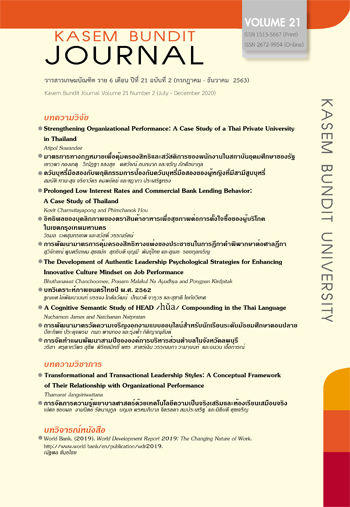อัตราดอกเบี้ยต่ำอย่างต่อเนื่องเป็นเวลานานและพฤติกรรมปล่อยกู้ของธนาคารพาณิชย์: กรณีศึกษาของประเทศไทย
คำสำคัญ:
Prolonged low interest rates, bank lending channel, bank liquidity, bond, leverage, borrowบทคัดย่อ
วัตถุประสงค์ เพื่อศึกษาความไวของพฤติกรรมการปล่อยกู้ต่อสัดส่วนสภาพคล่องต่อสินทรัพย์ของธนาคารพาณิชย์ และผลของการมีอัตราดอกเบี้ยต่ำมากเป็นเวลานานต่อความไวของพฤติกรรมดังกล่าว วิธีการศึกษา วิธีการเป็นแบบ two-step procedures ใช้ panel vector autoregressive models (Panel VAR) ที่สามารถชี้ให้เห็นถึงความสอดคล้องของการเคลื่อนไหวของตัวแปรที่เกี่ยวข้องเมื่อมีการเปลี่ยนแปลงในอัตราดอกเบี้ย ใช้ข้อมูลรายธนาคารของ 19 ธนาคารพาณิชย์ในช่วงเวลาไตรมาสที่ 1 ของปี 2001 ถึงไตรมาสที่ 1 ของปี 2019 เพื่อวัดประสิทธิผลของพฤติกรรมการปล่อยกู้ของธนาคารพาณิชย์ ช่วงสุดท้ายวิเคราะห์ถึงนโยบายที่อาจสรุปได้จากการศึกษา ผลการวิจัย ธนาคารพาณิชย์มีการเปลี่ยนพฤติกรรมการปล่อยกู้ในช่วงดอกเบี้ยต่ำ ๆ ซึ่งมีผลต่อประสิทธิผลของการใช้นโยบายการเงินแบบผ่อนคลายของธนาคารพาณิชย์ สรุป นโยบายอัตราดอกเบี้ยต่ำมากต่อเนื่องเป็นเวลายาวนานทำให้ธนาคารพาณิชย์ปรับพฤติกรรมการปล่อยกู้และทำให้นโยบายการเงินแบบผ่อนคลายมีประสิทธิภาพลดลง
ดาวน์โหลด
เผยแพร่แล้ว
รูปแบบการอ้างอิง
ฉบับ
ประเภทบทความ
สัญญาอนุญาต
Any views or opinions expressed in this issue of the Kasem Bundit University Journal are those of the authors alone and do not necessarily reflect the views or opinions of Kasem Bundit University or the editors.







